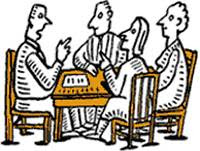John 8 is mostly a record of a conversation between Yahshua and groups of scribes and Pharisees.
 It's a rather lopsided exchange with lengthy explanations from him, in response to short questions and statements from them.
It's a rather lopsided exchange with lengthy explanations from him, in response to short questions and statements from them.There is a great deal here for us to investigate and digest. So let's look at just one small aspect, the remarks Yahshua makes that highlight what the Father does for him. There are nine of these, we'll deal with them in three logical groups (not in the order they are given in the chapter).
As we look at these remarks, notice how they are true of all healthy parent/offspring relationships. In other words they are true for fathers towards their sons and daughters, and for mothers towards their sons and daughters. Since everyone reading this must be a father, mother, son, or daughter (and in many cases two of those things) everything Yahshua says about his Father can be applied to our own lives too. Think about that as you read.
The first group is about the Father's position in relation to the Son
- The Father sent him (verse 16) - Our children grow up and we send them out into the world to live their own lives. And although the Word was with the Almighty even before creation, he was sent into the world. And once here in bodily form he had to be born, feed on milk, wean, grow, learn to speak and walk, learn a trade, and prepare for his adult life. He was sent into the world to live as Elohim with us (Emmanu-El).
- The Father stands with him (verse 16) - How could he not stand with his Son? Everywhere the Son goes, the Father is too, they are inseparable (except for that awful time at the Place of the Skull). That is why Yahshua could say to the disciples, 'If you have seen me, you have seen the Father.'
- The Father is with him, he doesn't leave him alone (verse 29) - This is similar to the last point, yet subtly different. Standing is a passive thing, but when we are with someone we are not necessarily passive. I am certain that the Father and the Son are in constant conversation. And I know the conversation didn't stop while the Son was here on the earth. (See the next group of remarks.) Also, the Father's heart is for the Son.
- The Father speaks to him (verse 26) - This is the conversation mentioned above. A constant flow of sharing.
- The Father teaches him (verse 28) - Not only is there a conversation going on, but part of it is in some sense instructional. Yahshua often said that he only did what he saw the Father do.
- The Father shows him things (verse 38) - There's great joy in a parent showing things to a child. This is a pleasure all parents should experience, and something all children should enjoy. It remains true even when the child is an adult. The same pleasure and enjoyment are shared between the Father and the Son.
- The Father is pleased by the things his Son does (verse 29) - We all know the joy of being pleased with a child's achievements or knowing that a parent is pleased with us.
- The Father is his witness and testifies for him (verse 18) - What better or more reliable witness can a person have than their own parent? What a tragedy it is when a parent will not testify on behalf of their own child!
- The Father glorifies him (verse 54) - And in the end, the Father's purpose is to glorify the Son. This is one of those facts the Bible shares with us that shows the Father and the Son are co-equal. If the Father had precedence over all he would surely not glorify another, not even the Son. The Father crowns his Son with glory after glory.
< John 7 | Index | John 9 >






